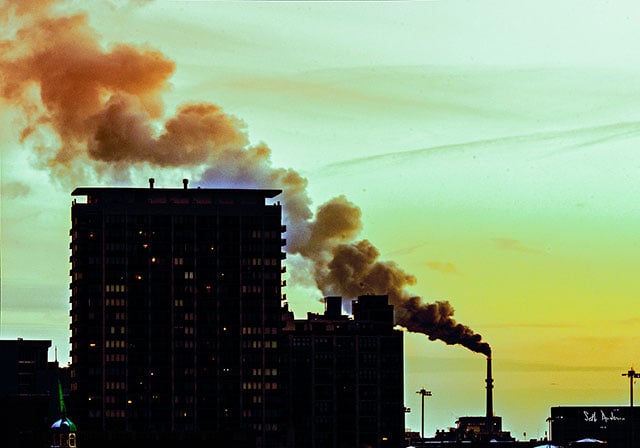
Honest, paywall-free news is rare. Please support our boldly independent journalism with a donation of any size.
As the presidential election season forges ahead with myriad discussions about race in the United States, we’d like the candidates to take a hard look at an insidious, pervasive form of racism: the environmental injustices that are being perpetrated against our country’s most vulnerable populations every day.
In the United States, the costs of pollution are borne disproportionately by African-American, Latino and Native American communities. These are the communities that get stuck with too many power plants and oil refineries, waste-transfer stations and toxic waste and garbage dumps. These are the communities that suffer higher infant mortality, poorer health and shorter life spans; lost jobs and resources; and a greatly diminished quality of life. We cannot tolerate the fact that 68 percent of African Americans live within 30 miles of a coal-fired power plant that can poison their air and water.
As an example, half of the 1,400 coal ash dumps in the United States have no liners — plastic sheets ostensibly designed to prevent coal ash from leaking into the ground and water table — and 70 percent are situated in low-income communities. Waterkeeper Alliance has investigated dozens of coal ash dumps all over the country. As a result of our investigations in North Carolina, Duke Energy is now being prosecuted for illegal pollution that was discovered leaking out of every single one of its 14 coal ash sites in the state.
Huge amounts of coal ash threaten communities across Georgia. From Rome all the way down to Savannah, coal ash sits in unlined pits at 12 power plant sites in the state. There have also been recent attempts to import coal ash from these sites (and sites in other states) into Georgia communities where no coal ash had been disposed previously. The transfer of coal ash to new locations poses a particular risk of environmental injustice, because ash is more likely to be dumped on the politically disadvantaged communities that have the fewest resources to fight it.
Another egregious example occurs with industrialized animal production. In North Carolina, more than 2,200 factory hog operations housing more than 10 million hogs are concentrated in the southeastern part of the state, and in disproportionately close proximity to communities of color.
These facilities store untreated animal excrement in enormous open-air cesspools that overflow into local waterways or leach into the shallow groundwater of North Carolina’s coastal plain. The liquefied hog waste is then sprayed through the air onto nearby fields, where it drifts onto neighboring homes. Not only are local residents faced with the constant stench and pollution from these facilities, but also studies have shown that those who live near them may also suffer from higher rates of respiratory problems, anxiety, depression and sleep disturbances.
In September 2014, Waterkeeper Alliance, along with partner groups, filed a complaint with the Environmental Protection Agency (EPA) Office of Civil Rights under Title VI of the Civil Rights Act of 1964, alleging that lax regulation of hog waste disposal discriminates against communities of color in eastern North Carolina. Although our complaint has been accepted for investigation, we are greatly concerned about how the complaint will be handled, because it is a known fact that in its 22 years of processing these complaints, the EPA has never issued a formal finding of discrimination.
The EPA has launched a new initiative to reform its own policies in light of its horrendous enforcement record. Instead of strengthening them, the EPA’s Office of Civil Rights is planning to eliminate key deadlines for accepting and investigating civil rights violations. This is troubling because the EPA has historically taken an average of 350 days just to decide whether to investigate a case. While the EPA’s Office of Civil Rights is the only civil rights office in federal government with self-imposed deadlines, we question how violations will be reduced if deadlines are eliminated.
How can we ever have equality if we do not guarantee protections for communities of color? This is a moral cause and we call on the EPA to strengthen its policies and start getting serious about enforcing Title VI.
Matching Opportunity Extended: Please support Truthout today!
Our end-of-year fundraiser is over, but our donation matching opportunity has been extended! All donations to Truthout will be matched dollar for dollar for a limited time.
Your one-time gift today will be matched immediately. Your monthly donation will be matched for the whole first year, doubling your impact.
This matching gift comes at a critical time. As Trump attempts to silence dissenting voices and oppositional nonprofits, reader support is our best defense against the right-wing agenda.
Help Truthout confront Trump’s fascism in 2026, and have your donation matched now!